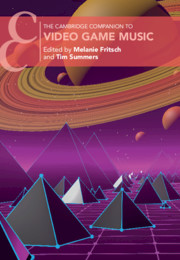Book contents
- The Cambridge Companion to Video Game Music
- Cambridge Companions to Music
- The Cambridge Companion to Video Game Music
- Copyright page
- Contents
- Figures
- Tables
- Musical Examples
- Contributors
- Preface
- A Landmark Timeline of Video Game Music
- Foreword: The Collaborative Art of Game Music
- Introduction
- Part I Chiptunes
- Part II Creating and Programming Game Music
- Part III Analytical Approaches to Video Game Music
- Part IV Realities, Perception and Psychology
- Part V Game Music, Contexts and Identities
- Part VI Beyond the Game
- 22 Pop Music, Economics and Marketing
- 23 Game Music Beyond the Games
- 24 Producing Game Music Concerts
- Select Bibliography
- Index
- References
23 - Game Music Beyond the Games
from Part VI - Beyond the Game
Published online by Cambridge University Press: 15 April 2021
- The Cambridge Companion to Video Game Music
- Cambridge Companions to Music
- The Cambridge Companion to Video Game Music
- Copyright page
- Contents
- Figures
- Tables
- Musical Examples
- Contributors
- Preface
- A Landmark Timeline of Video Game Music
- Foreword: The Collaborative Art of Game Music
- Introduction
- Part I Chiptunes
- Part II Creating and Programming Game Music
- Part III Analytical Approaches to Video Game Music
- Part IV Realities, Perception and Psychology
- Part V Game Music, Contexts and Identities
- Part VI Beyond the Game
- 22 Pop Music, Economics and Marketing
- 23 Game Music Beyond the Games
- 24 Producing Game Music Concerts
- Select Bibliography
- Index
- References
Summary
The influence of games, and their music, extends well beyond the boundaries of the game texts. Outside of Jesper Juul’s ‘magic circle’, the imagined space in which the rules of the game apply and play occurs, are worlds of meaning, consumption and community that reflect and serve to transmit our own lived experience with the medium.1 This chapter investigates game music removed from context of the video games that contain it, instead focusing on the role of game music in the context of wider culture. As part of that exploration, this chapter marks how the availability of communication and audio production tools from the year 2000 to the present affords fan communities surrounding game audio an ever-increasing potential for discussing, transmitting, remixing and otherwise exploring the music of the games we play. I say ‘we’ in the inclusive sense intentionally, as an insider of a number of fan groups engaging with game audio. Though this essay attempts to remain relatively detached throughout, I follow scholar Henry Jenkins in describing myself as a fan, and in pointing out that even when writing on subjects that ‘are not explicitly personal, [I] deal with forms of culture that have captured my imagination and sparked my passion’.2
- Type
- Chapter
- Information
- The Cambridge Companion to Video Game Music , pp. 409 - 423Publisher: Cambridge University PressPrint publication year: 2021
References
Further Reading
- 2
- Cited by

